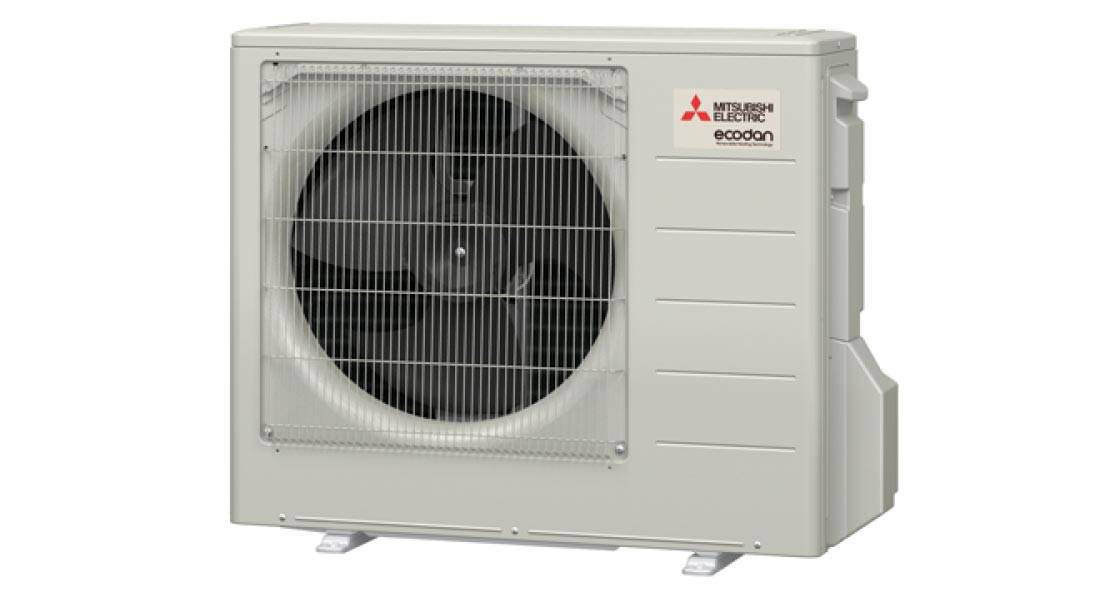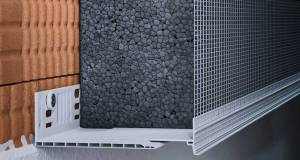
- Marketplace
- Posted
Mitsubishi heat pumps 6-7 times lower CO2 than condensing gas boilers
Leading sustainable heating, ventilation and air conditioning systems manufacturer Mitsubishi Electric has produced analysis showing the whole life carbon calculations of its heat pumps may be six to seven times lower than comparable condensing gas boilers.
This article was originally published in issue 41 of Passive House Plus magazine. Want immediate access to all back issues and exclusive extra content? Click here to subscribe for as little as €10, or click here to receive the next issue free of charge
Mitsubishi Electric UK – which manufactures heat pumps in its Livingston-based factory – assessed the embodied carbon of eight heat pumps including six domestic units, and two commercial units against CIBSE’s TM65 methodology for calculating the embodied carbon of building services, which was published last year.
The assessment included Mitsubishi’s residential monobloc air-to-water heat pump range, including the QUHZ W40VA – a 4 kW air-towater heat pump which uses R744 refrigerant, and is becoming popular with passive house designers.
R744 is the name for refrigeration-grade CO2, which combines two properties of note for sustainable buildings. R744 can achieve hot water at a higher co-efficiency of performance (COP) than more traditional refrigerants – which may make it ideally suited to passive houses, where in some cases the hot water load may be higher than the space heating load. R744 also boasts an ultra-low global warming potential (GWP). One of the largest environmental impacts of a heat pump can exist in its refrigerant circuit. R410 – which is still commonly used in many heat pumps – has a GWP of 2088, meaning that each kilo of refrigerant in the machine is equivalent to 2,088 kg of CO2. R744, by comparison, has a GWP of 1 – because a kilo of R744 is simply a kilo of CO2. The machine posted an impressive total of just 618 kg CO2e.
The analysis also included five heat pumps in Mitsubishi’s PUZ range – respectively including 5, 6, 8.5, 11.2 and 14 kW outputs, which posted relatively low embodied carbon scores ranging from 1,294 to 1,798 kg. The PUZ range uses R32, a refrigerant which has a GWP of 675 – a marked improvement on R744 and R410a, which remain commonly used in heat pump applications with requirements for low temperature heat. The analysis, which used CIBSE’s midlevel TM65 calculation approach, focused on the outdoor units, meaning separate analysis would be required to quantify the embodied carbon of indoor units, including a hot water tank.
The analysis included the embodied carbon and estimated operational carbon of each heat pump over an assumed 15-year design life, and compared the combined totals against equivalently sized gas boilers with a nominal embodied carbon score of 300 kg CO2e, and assumed efficiencies of 93 per cent. In each case, the combined whole life carbon score for the six heat pumps was six to seven times lower.
Laurent Widloecher, residential heating product manager at Mitsubishi Electric said: “Mitsubishi Electric is serious about sustainability. Heat pumps are a key part of the climate fight because of their ability to deliver massive carbon savings compared to gas – reductions that will become even greater as the electricity grid continues to decarbonise. But we can’t afford to ignore the emissions released in manufacturing, maintenance and ultimately the end of life of heating systems. Mitsubishi can help to ensure that operational carbon savings don’t come at the cost of a needless embodied carbon penalty.”
Widloecher added that as monobloc technology contains its refrigerant within the unit, no refrigerant charge or refill would be required on site or over the product lifetime in normal use.
Related items
-
 New Ejot profile cuts thermal bridging losses by 25mm insulation equivalent
New Ejot profile cuts thermal bridging losses by 25mm insulation equivalent -
 Build Homes Better updates Isoquick certification to tackle brick support challenge
Build Homes Better updates Isoquick certification to tackle brick support challenge -
 Ecological Building Systems expands UK and Irish straw panel construction with EcoCocon deal
Ecological Building Systems expands UK and Irish straw panel construction with EcoCocon deal -
 Focus on better buildings, not better spreadsheets
Focus on better buildings, not better spreadsheets -
 MBC offers total passive house envelope solutions
MBC offers total passive house envelope solutions -
 Historic Dublin building retrofitted with cutting edge insulation
Historic Dublin building retrofitted with cutting edge insulation

